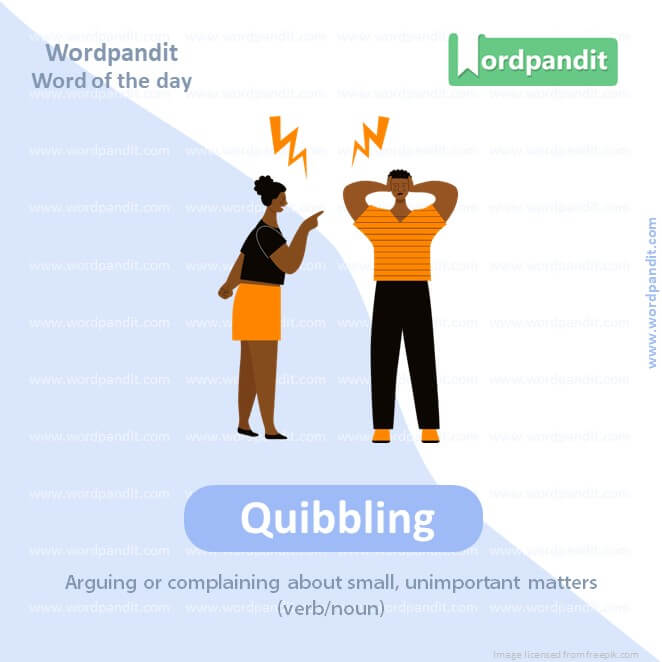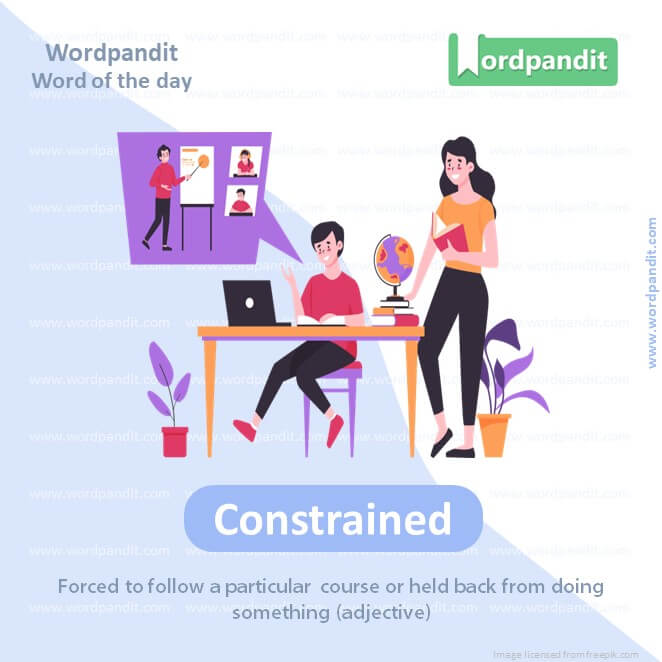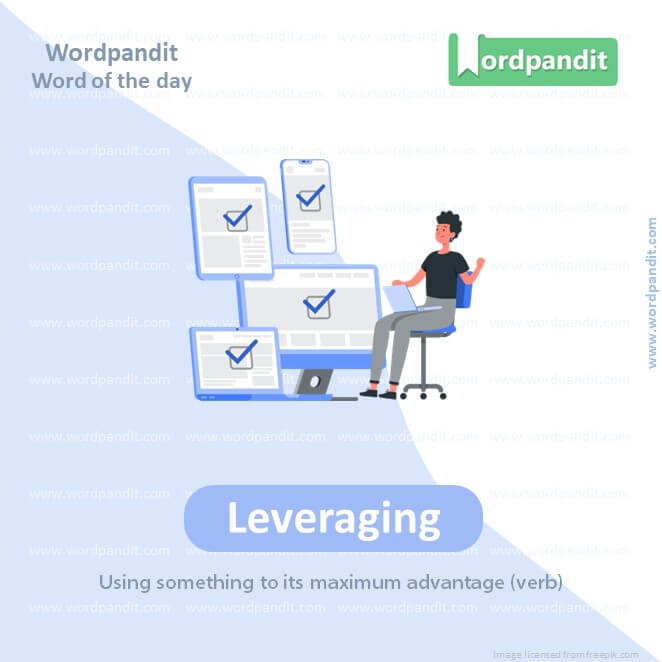Daily Vocabulary Words: List of Daily Used Words in Leading Indian Newspapers
Hi there. Welcome to this special section @ Wordpandit. Our endeavour here is straightforward: highlighting daily vocabulary words that you would come across in leading newspapers in the country. We have included the following newspapers in our selection:
• The Times of India
• The Economic Times
• Hindustan Times
• Mint
• Indian Express
We are putting in extensive work to develop your vocabulary. All you have to do is be regular with this section and check out this post daily. This is your repository of commonly used words; essentially, we are posting a list of daily used words. Hence, this has significant practical application as it teaches you words that are commonly used in leading publications mentioned above.
Visit the website daily to learn words from leading Indian newspapers.

WORD-1: Quibbling
CONTEXT: There is little political gain for the Opposition in quibbling about this prospect and questioning the data.
SOURCE: Indian Express
EXPLANATORY PARAGRAPH: Quibbling is like when you and your friend argue about very small things that don’t really matter, like whose turn it is to choose a game.
MEANING: Arguing or complaining about small, unimportant matters (verb/noun).
PRONUNCIATION: KWIB-ling
SYNONYMS: nitpicking, bickering, fussing,
squabbling, nit-picking
USAGE EXAMPLE:
1. Stop quibbling over who gets the bigger slice of cake.
2. The siblings spent hours quibbling over which TV show to watch.
3. They wasted time quibbling instead of focusing on the important issues.
4. His constant quibbling annoyed everyone in the group.
WORD-2: Foreseeable
CONTEXT: India’s weight in the international system will continue to grow for the foreseeable future.
SOURCE: Indian Express
EXPLANATORY PARAGRAPH: Something that is foreseeable is something you can predict or guess will happen in the future, like knowing it will rain because you see dark clouds in the sky.
MEANING: Able to be predicted or expected (adjective).
PRONUNCIATION: for-SEE-uh-bul
SYNONYMS: predictable, expected, anticipated,
likely, probable
USAGE EXAMPLE:
1. The consequences of his actions were foreseeable.
2. It was foreseeable that traffic would be heavy during rush hour.
3. The company’s success was not foreseeable a year ago.
4. The predictable outcome was foreseeable from the start.

WORD-3: Constrained
CONTEXT: Years of self-perception as a weak and vulnerable nation constrained India’s ambitions and constructed a diplomatic language that tended to be defensive, defiant and passive-aggressive.
SOURCE: Indian Express
EXPLANATORY PARAGRAPH: When you’re constrained, it’s like feeling stuck or limited, such as when you want to play outside but it’s raining, so you’re constrained to stay indoors.
MEANING: Forced to follow a particular course or held back from doing
something (adjective)
PRONUNCIATION: kun-STREYND
SYNONYMS: restricted, limited, confined, restrained, bound
USAGE EXAMPLE:
1. Due to budget constraints, we couldn’t go on a vacation this year.
2. Her creativity was constrained by the strict guidelines.
3. The team felt constrained by the lack of resources.
4. The project’s timeline was constrained by external factors.
WORD-4: Unabashed
CONTEXT: How Delhi talks to the world has clearly changed — it is increasingly unabashed in its emphasis on national interests and global ambitions; it has avoided, so far, the dangers of looking too aggressive.
SOURCE: Indian Express
EXPLANATORY PARAGRAPH: Being unabashed means not feeling embarrassed or shy about something, like confidently singing in front of others even if you’re not a great singer.
MEANING: Not embarrassed or ashamed (adjective).
PRONUNCIATION: uhn-uh-BASHT
SYNONYMS: unashamed, shameless, bold, fearless, confident
USAGE EXAMPLE:
1. She was unabashed in expressing her opinions.
2. His unabashed enthusiasm for the project was infectious.
3. Despite the criticism, he remained unabashed about his beliefs.
4. The comedian’s jokes were delivered with unabashed humor.

WORD-5: Hustled
CONTEXT: It is an idea inherited from the era of post-colonial insecurity and the persistent anxiety about being hustled into unwanted decisions by major powers.
SOURCE: Indian Express
EXPLANATORY PARAGRAPH: When someone is hustled, it means they’re moving quickly and working hard to get things done, like when you rush to finish your homework before dinner.
MEANING: Moved or worked quickly and energetically (verb).
PRONUNCIATION: HUHS-uhld
SYNONYMS: hurried, rushed, bustled, scurried, hastened
USAGE EXAMPLE:
1. She hustled to finish the project before the deadline.
2. The team hustled to prepare for the upcoming presentation.
3. He hustled through the crowded streets to catch the bus.
4. They hustled to get everything ready for the party.
WORD-6: Inevitably
CONTEXT: But when you are a major power in your own right, your autonomy inevitably expands.
SOURCE: Indian Express
EXPLANATORY PARAGRAPH: Inevitably means something that is bound to happen, like knowing that winter will come after autumn every year.
MEANING: Unavoidably or certain to happen (adverb).
PRONUNCIATION: in-EV-i-tuh-bly
SYNONYMS: unavoidably, inevitably, certainly, unavoidably, invariably
USAGE EXAMPLE:
1. With his hard work, success was inevitably within reach.
2. Change is inevitably part of life.
3. The truth will inevitably come out.
4. Despite the obstacles, progress is inevitably made.

WORD-7: Leveraging
CONTEXT: It is about leveraging India’s growing weight in the international system to generate greater security and prosperity for its citizens.
SOURCE: Indian Express
EXPLANATORY PARAGRAPH: Leveraging means using something to your advantage, like using your knowledge of math to solve a difficult problem.
MEANING: using something to its maximum advantage (verb)
PRONUNCIATION: LEV-er-ij-ing
SYNONYMS: exploiting, utilizing, capitalizing,
using, harnessing
USAGE EXAMPLE:
1. The company is leveraging technology to improve its services.
2. She is leveraging her experience to succeed in her new role.
3. They are leveraging social media for marketing purposes.
4. The team is leveraging its strengths to overcome challenges.
WORD-8: Articulating
CONTEXT: That prevented the Indian political classes from articulating specific external goals.
SOURCE: Indian Express
EXPLANATORY PARAGRAPH: Articulating means expressing something clearly and effectively, like explaining your favorite game to a friend so they understand how to play.
MEANING: Expressing ideas or feelings clearly and effectively (verb).
PRONUNCIATION: ahr-TIK-yuh-leyt-ing
SYNONYMS: expressing, communicating, conveying, stating, elucidating
USAGE EXAMPLE:
1. She did a great job of articulating her thoughts during the debate.
2. Articulating complex concepts in simple terms is a valuable skill.
3. The speaker had difficulty articulating his emotions.
4. He is skilled at articulating his arguments persuasively.

WORD-9: Exuberance
CONTEXT: Rather than carping at this exuberance, the Opposition must press for a debate on the best possible pathways to that goal.
SOURCE: Indian Express
EXPLANATORY PARAGRAPH: Exuberance is like having a lot of excitement and energy, such as when you’re at a birthday party with your friends and playing games.
MEANING: High spirits or lively enthusiasm (noun).
PRONUNCIATION: ig-ZOO-buh-runs
SYNONYMS: enthusiasm, excitement, vivacity, vigor, zest
USAGE EXAMPLE:
1. The children played with exuberance in the park.
2. Her exuberance for life was contagious.
3. The team celebrated their victory with great exuberance.
4. The puppy greeted them with exuberance every time they came home.
WORD-10: Carping
CONTEXT: Rather than carping at this exuberance, the Opposition must press for a debate on the best possible pathways to that goal.
SOURCE: Indian Express
EXPLANATORY PARAGRAPH: Carping is when someone keeps finding faults or complaining about small things, like always pointing out that your room is messy.
MEANING: Constantly finding fault or complaining (noun/verb).
PRONUNCIATION: KAHR-ping
SYNONYMS: complaining, nitpicking, fault-finding,
criticizing, grumbling
USAGE EXAMPLE:
1. His carping attitude made it hard to enjoy the outing.
2. She spent the entire meeting carping about minor details.
3. The critic’s carping reviews did not affect the movie’s popularity.
4. Instead of enjoying the party, he spent his time carping about the music.
Vocabulary Daily Use Words
In the architecturally diverse world of language learning, ‘vocabulary daily use words’ act as a cornerstone. We often take these words for granted, but their significance in day-to-day communications is nothing short of monumental. Mastering these ‘vocabulary daily use words’ should be more than an ancillary task on the sideline; it should take the center stage in your language learning journey.
To begin with, approach ‘vocabulary daily use words’ with the same gusto and reverence as you would an untapped treasure chest. Go beyond the conventional realm of textbooks and explore the world of contemporary literature, newspapers, and digital content. By immersing yourself in these mediums, you’re aligning your learning with real-world language usage, thereby gaining a practical understanding of ‘vocabulary daily use words.’
Memory-enhancing tools add an extra layer of effectiveness to your learning. Flashcards, for example, are a great way to make your study sessions interactive and memory-forging. Coupled with the Leitner system, which is a principle of spacing and repetition, you can ensure better recall and understanding of ‘vocabulary daily use words.’
Furthermore, leveraging mnemonic devices aids in etching the ‘vocabulary daily use words’ into your memory. Associating common words with unique and memorable narratives in your mind enhances their recall. Regular revision and using these words in routine conversations further cement your proficiency.
The potency of immersion as a language learning strategy cannot be emphasized enough. Conversing with native speakers, if possible, provides context to ‘vocabulary daily use words’ and boosts your fluency.
In conclusion, mastering the ‘vocabulary daily use words’ is an enriching journey that requires ongoing effort, continual exposure, and hands-on practice. The strategy of learning through various mediums, using memory-enhancing techniques, leveraging mnemonic devices, and immersion can help demystify these words and enhance your overall language proficiency. So, gear up and embrace the linguistic adventure of mastering the ‘vocabulary daily use words.’













